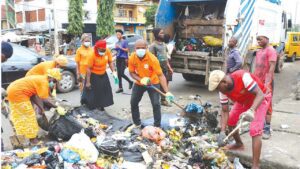
Food Sufficiency: Broadening strategic policies coverage to drive robust agriculture sector
The case of agriculture for repositioning of Nigeria’s economy has been given justification by potentials which have been weighed to bear push of growth if harnessed efficiently and effectively. The productivity of the sector, however, has been such which has remained at an edge largely insignificant to the elaborate demands of the economy. Coordinating policies and actions to bring forth the possibilities of the sector to strengthen the economy has been a course, the justification of which cannot be dispelled. While efforts have been geared towards this by the Government, the firmness of same and it’s coverage of impacts have been questionable.
Recently, when the deficits in food production begun to send notes of looming food crises in the Country, the look into the demands of food sufficiency became a reality that cannot be shied away from. The demands as of necessity has put forth the need to fortify the productive profile of the sector. Towards this, making the coverage of policy frameworks, provisions and special interventions elaborate and largely encompassing enough, has become pertinent.
Of such demands, is the need to develop and maintain a system of coordination that captures diverse range of stakeholders bearing contributory significance in the sector. As the recent necessities began by reality to draw more attention to the sector, the need to integrate the new phase of actors into the system to blend along, with access, the provisions that would encourage more stakeholders has become necessary. This remains important to sustain the drive towards a robust sector with strong base upon which the economy can spread its rest on.
Recently, the attraction of interest of women actors into the field of agriculture has been rising into a phenomenon growing to create a shape to feel a particular vacuum of the huge deficits in the sector. However, the course to drive for a sustainable push is one that would be deliberate to factor into the sector, a section of the society whose push into the sector has huge potentials to cover up vacuums lying fallow. The coordination of policies strategically to give coverage to this rising actors for an elaborate impacts on sustainable strength has become necessary.
The need therefore to turn attention to policies, which in strategic dimension would fit appropriately to complement the existing structures for more productivity, has become necessary. Complains regarding poor and lack of conscious attention to this set of women actors in the sector have been noted among many others, as one of the areas where an apparent passiveness have been displayed to the possibilities that such actors could spring forth in the sector. The sensitivity needed to incorporate women actors to build interest in the sector, has become important. Just as recently, drive to incorporate youth actors into the sector has begun to create new dimensions of fresh push in the sector.
Synchronising attention to women actors would no less bear its impacts of good returns. Recently, the ActionAid Nigeria (AAN) in a study titled ‘Community Participatory Assessment of Government Expenditure on Agriculture/Community Score Cards on Smallholder Women Farmers Access to
Extension Services’ lamented poor access of women farmers to agricultural extension services, a condition of neglect it noted has placed concerns before stakeholders.
The study revealed women farmers make-up 70 per cent of agricultural labour; 50 per cent in animal husbandry related activities; and 60 per cent in food processing activities. However, women have access to less than 20 per cent of available agricultural resources despite their enormous contribution to food production and feeding over 200 million mouths on daily basis. The study revealed, “However, the effectiveness and efficiency of the extension system have remained a major source of concern as they have not produced the desires results that will ensure sustainable agricultural development, poverty alleviation and improved livelihood, especially, for rural farm families. The major challenges limiting women farmers’ access to effective agric extension services that the critical stakeholders including Federal and State Governments, development partners and Civil Society Organisations, CSOs, need to focus on are inadequate staffing, poor funding. Lack of training opportunities for extension personnel, lack of mobility for extension personnel and for field monitoring.
“Lack of parity in renumeration between the livestock extension agents and others. The other area of focus is on; small-scale women farmers’ lack of access to important production- enhancing inputs, particularly, improved seeds and seedlings, fertilizers, and land preparation processing equipment. Limited access to farming land, compounded by insecurity in the farms.
Limited access to agricultural extension services; Lack of capacity building opportunities; Lack of access to processing and storage facilities; Lack of access to market information.
“The enactment of an agricultural extension policy to guide and regulate the practice of agricultural extension and advisory services in Nigeria, for assures and sustainable funding mechanism and quality control. Special Extension Outreach Programme for women, youth and other marginalized groups. Extension staff service condition require review to make the service attractive, especially, now that youth are being encouraged to go into agriculture. The dichotomy between livestock salary scale and others in the agricultural sector must be addressed. Significant improvement in the funding of public agricultural extension services by the Federal and State Governments. There must be synergy between the donor- assisted projects located within the Ministry and ADP activities to avoid duplication, wastage and unhealthy rivalry. The same must be done with the other State created agencies that have extension objectives. Rather than create new structures, the ADP structures and staff must be strengthened to take on the new responsibilities.”
The demands of food insufficiency in Nigeria, has placed before the Country, the demands to develop structures of pragmatic measures within an elaborate system, encompassing to accommodate new actors and incorporate new parameters to boost the productivity of the sector. Beyond the needs of addressing the threats of food crises, the strains in the Country’s economy has put forth the effects of the deformities of its mono-cultural oil-mainstay dependence. That agriculture has been significantly reckoned with, to bear possibilities to redefine the reliance base of the economy, demands that the Government as the driver of the course, establish the patterns that would govern the systemic response of sector towards the reality placed before the Country.



